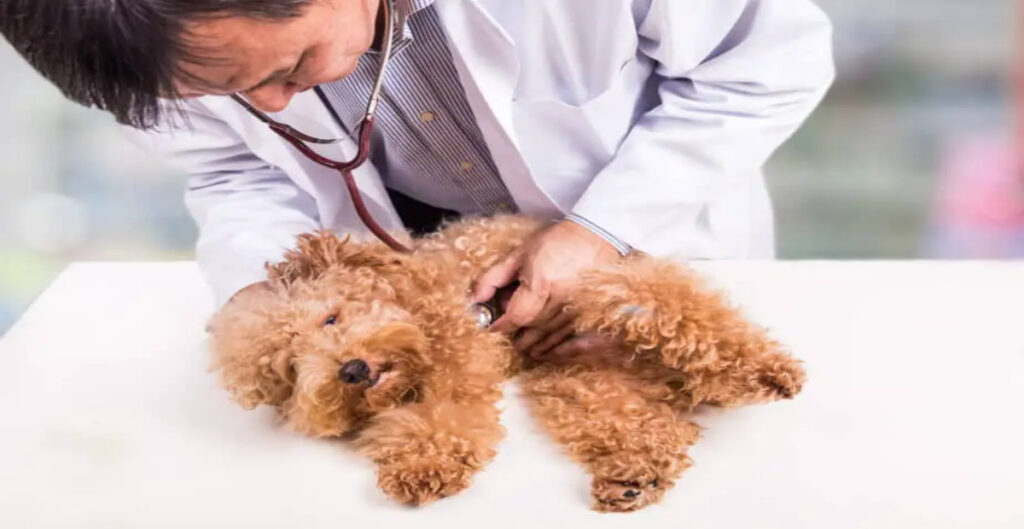
The toy poodle is a popular dog breed that originated in France. Standing under 10 inches tall and weighing 5-10 pounds, toy poodles are the smallest version of the poodle breed. Known for their intelligence, playfulness and hypoallergenic coats, Toy Poodles make excellent companion dogs.
Toy poodles have an average lifespan of 14-18 years. With proper care and nutrition, toy poodles can live happy and healthy lives well into their senior years. This article will look at common health issues affecting toy poodles in Greece and provide an overview of preventative care and treatment options available.
Common health issues for toy poodles

Dental disease
Dental disease is one of the most common health problems seen in toy poodles. Tartar build-up, gingivitis and periodontal disease can start as early as puppyhood if teeth are not properly cared for. Annual cleanings and daily brushing can help prevent painful dental problems. Vets may recommend dental work if there is advanced disease.
Ear infections
Poodles’ droopy ears trap moisture, making them prone to ear infections. Regular cleaning of the ears, brushing of the hair inside the ears and early treatment of any infections are important to prevent recurrence. Medicated ear cleaners and antibiotic drops may be prescribed for bacterial and yeast infections.
Shiny Patellas
A sprained patella refers to a patella that moves out of position. Toy poodles are at risk for this inherited condition because of their small size. Mild cases may only cause temporary lameness, but surgery may be needed for severely affected dogs. Maintaining a healthy weight can help reduce stress on the knees.
Legg-Calve-Perthes disease
This orthopedic condition affects the hip joint, causing lameness and muscle loss in the hind legs. It occurs when the blood supply to the femoral head is disrupted, leading to bone necrosis. Surgery to remove the femoral head can help restore function. Physical therapy then helps with recovery.
Cushing’s disease
An endocrine disorder caused by excessive production of cortisol, Cushing’s is most commonly diagnosed in older toy poodles. Symptoms include increased thirst/urination, appetite and shortness of breath, as well as hair loss and thin skin. Medication and diet changes can help manage the condition once it’s diagnosed.
Epilepsy
Seizures caused by epilepsy are not uncommon in toy poodles. Episodes are often brief and may not require medication if they are infrequent. If seizures are prolonged or occur in clusters, anticonvulsant medication will likely be prescribed daily to prevent further episodes.
Heart disease
Progressive heart conditions such as mitral valve disease and dilated cardiomyopathy may develop in later years. Symptoms include cough, weakness and exercise intolerance. Various medications can help support heart function, but vet monitoring is key.
Diabetes
Middle-aged and older toy poodles can develop diabetes mellitus if the pancreas does not produce enough insulin. Increased thirst/hunger, weight loss and high blood sugar are typical signs. Insulin therapy, diet and exercise can successfully manage the disease.
Chronic kidney disease
Gradual renal failure is common in larger toy poodles. Signs may include increased thirst, weight loss, poor appetite and vomiting. Special kidney diets, medications, and IV fluids can help support kidney function, but dialysis or a transplant may eventually be required.
Cancer
Cancer is the leading cause of death in older poodles. Common cancers include lymphoma, breast tumors, hemangiosarcoma, and others. Treatment options such as surgery, chemotherapy, and radiation therapy are sometimes pursued for some cancers if they are caught early.
Preventive care
Preventative care is the key to keeping Toy Poodles healthy and minimizing the risks of disease. Recommended guidelines include:
Annual vet exams to check for problems

Monthly wellness exams at home
Blood routine as needed to check organ function
Vaccinations every 3 years to protect against infectious diseases
Monthly medication to prevent heartworm, fleas and ticks
High quality diet designed for toy dogs
Annual dental cleanings and daily tooth brushing
Trim nails every 2-3 weeks to maintain healthy feet
Daily exercise and mental stimulation
Puppies should have an initial exam, shots and deworming on a set schedule during their first year. Spaying or neutering around 6 months prevents reproductive cancers later in life. Following the recommended guidelines helps to address problems early and creates a lifetime of good health.
Access to Care in Greece

Pet ownership is popular in Greece, with dogs outnumbering cats as the preferred companion animal. Veterinary care is available through both private practices and universities across the country. Greece has over 2,000 licensed veterinarians to serve the pet population.
Most Greek veterinarians work in small clinics or hospitals located in cities and towns. Younger vets are more likely to speak English while older generations often only speak Greek. A few pet insurance plans are available, but costs are generally lower than other parts of Europe.
Faculty-affiliated university veterinary hospitals such as Aristotle University and University of Thessaly offer advanced care options with specialists and emergency services. These referral hospitals are located in larger cities such as Thessaloniki and Karditsa.
While quality care exists, there are challenges to veterinary access in rural areas. Veterinarian shortages are most acute in islands and remote areas. Private ownership of clinics is lower than the EU average. Mobile veterinary units help serve rural communities a few days a month.
Online pharmacies facilitate the acquisition of medicines and products for owners throughout Greece. Overall, the country offers a variety of veterinary resources to support the health and longevity of toy poodles. With proper preventative care and attention to any matter, toy poodles can thrive in Greece.
conclusion
Toy poodles are a favorite breed in Greece and worldwide for their friendly nature and lively character. Giving them careful care and taking them to annual vet visits gives them the best chance for a long, healthy life. Being aware of common conditions associated with the breed allows owners to monitor their dog’s well-being between check-ups. With a commitment to prevention and early treatment, toy poodles can enjoy their golden years with their human families in Greece.
FAQs
The most common health problems seen in Greek Toy Poodles include dental disease, ear infections, patella, Legg-Calve-Perthes disease, Cushing’s disease, epilepsy, heart disease, diabetes, chronic kidney disease and cancer.
Pet insurance is not very common in Greece, but it can be beneficial to cover large medical expenses. Insurance policies are available from companies such as Spot Insurance and PetPlan. Compare options to find coverage that fits your needs and budget.
Most regions of Greece have private veterinary clinics and hospitals. Larger cities may also have university veterinary schools with specialty services. The website of the Hellenic Veterinary Association lists veterinarians throughout the country. Note that the availability of vets is lower in rural areas and islands.
Basic vaccines for Greek toy poodles include parvovirus, distemper, adenovirus and leptospirosis. Rabies vaccination is required by law. Non-essential vaccines may be recommended based on lifestyle and risk. An initial line of puppies is followed by boosters every 3 years.
Regular vet checkups, blood work and preventative care are important for senior dogs. Use joint supplements if arthritis is present. Adjust the diet according to health conditions. Maintain a consistent routine and continue mental stimulation. Monitor closely for any new signs of illness. With extra TLC, many toy poodles live happily into their mid to late teens.
For more: The health benefits of eggs for dogs in Greece
Dog Heart Health in Greece
